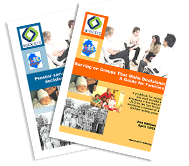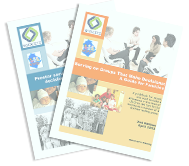The Toolkit is designed to provide educators with tools and resources for strengthening partnerships between schools and diverse families and communities. The six modules of the Toolkit are designed to help align systemic school, family, and community involvement efforts to characteristics and practices that are common to effective programs. The toolkit includes self-assessment and survey tools, standards linkages, research, effective practices, videos, and resources. The toolkit is arranged by each of the six types of parent involvement – communication, parent, student learning, volunteerism, shared decision-making, and collaborating with the community.
Two Webinars originally airing in November contain valuable information about current practices and trends for family-school-community partnerships:
- FINE, the Family Involvement Network of Educators at the Harvard Graduate School of Education, sponsored the Webinar, Using Leadership to Promote Strengths-Based Family Engagement. View the archived Webinar at:
https://hgse.adobeconnect.com/_a1081041235/p17zr723psj/?launcher=false&fcsContent=true&pbMode=normal.
- Education Week archived the Webinar, Empowering Parents to Transform Schools, available at:
https://secure.edweek.org/media/131115-empoweringparents.pdf
The IRIS Center is a national center dedicated to improving education outcomes for all children, especially those with disabilities birth through age twenty-one.
Designed to help teachers build positive relationships with families, this module highlights the diversity of families and addresses the factors that school personnel should understand about working with the families of children with disabilities.
Family Research Toolkit
The Beach Center Family Research Toolkit contains scales, surveys, checklists, and conversation guides we have developed in the course of our research. On this website, each tool is described (purpose and measurement), references and links to publications, current research and other resources to where it was used, and links to download the tool or how to request it for FREE.
Toolkit information: https://beachcenter.lsi.ku.edu/beach-families
Family-professional partnerships
In this partnership, families and professionals collaborate by capitalizing on each other's judgment and expertise in order to increase benefits for students, families, and professionals alike. The Beach Center on Disability has identified seven principles of family-professional partnerships: communication, professional competence, respect, commitment, equality, advocacy, and trust. Publications and articles can be found at:

